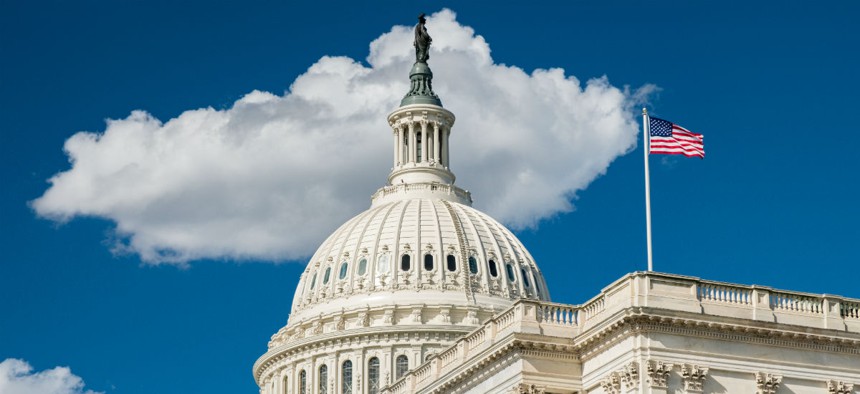Deal to Push Back Shutdown Deadline Faces Uncertain Prospects
Democrats and Tea Party members are still considering whether to support a two-week CR.
House appropriators on Saturday introduced a measure that would delay the possibility of a government shutdown for two weeks, but as of early Monday afternoon, it was unclear whether Democrats would support the short-term funding extension.
House Appropriations Committee Chairman Rep. Rodney Frelinghuysen, R-N.J., filed a continuing resolution that would keep the government funded at current spending levels until Dec. 22. The legislation follows a strategy laid out last month by House Speaker Paul Ryan, R-Wis., who said a short-term spending deal pushing back the Dec. 8 deadline would allow for lawmakers to continue negotiations on a bill to fund the government for the remainder of fiscal 2018.
“Continuing funding for federal operations is critical to our nation’s stability, our economy and for the well-being of the American people,” Frelinghuysen said in a statement. “It is a necessary step to ensure the programs and services that all Americans rely on are maintained and available to all . . . This CR will allow for additional time for a deal [to be] reached on top-line spending levels for this fiscal year.”
The bill also provides a stopgap measure to provide states with funding through the Children’s Health Insurance Program, which saw its authorization lapse in October. That measure would extend the deadline to reauthorize the program until Dec. 31.
The short-term CR is slated for a hearing before the House Rules Committee on Tuesday. And according to a schedule published by House Majority Leader Kevin McCarthy, R-Calif., it could receive a floor vote sometime between Wednesday and Friday.
But last week’s kerfuffle between President Trump and congressional Democrats could complicate the situation. Senate Minority Leader Chuck Schumer, D-N.Y., and House Minority Leader Nancy Pelosi, D-Calif., canceled a meeting at the White House after Trump tweeted that bipartisan negotiations would be unproductive.
Pelosi, however, emphasized that Democrats ultimately would like to avoid a shutdown. She and Schumer agreed on Monday to meet with Trump and their GOP counterparts Thursday to discuss government funding and other items on Congress' "year-end agenda."
"We want to keep government open," Pelosi said during a press conference. "That's what we are about. They have the votes, they have the presidential signature to do whatever they want, but Democrats are committed to keeping government open."
Among Democrats' demands heading into negotiations are funding for community health centers and CHIP, additional disaster relief appropriations, as well as a path forward on continuing the protected status of those covered by the Obama administration's Deferred Action for Childhood Arrivals program, which Trump announced earlier this fall he would end early next year.
Matt Dennis, a spokesman for Democrats on the House Appropriations Committee, said earlier Monday that the party’s committee members have not yet committed to supporting Frelinghuysen’s measure.
“Ordinarily, the rationale for agreeing to pass a temporary CR and give the majority more time is if there is reason to believe we are heading in the right direction toward getting a bipartisan full-year spending package enacted,” Dennis said. “I’m not sure we know that yet.”
Adding to the uncertainty are concerns that the House Freedom Caucus could withhold its support as well. Politico reported Monday that the group of conservatives had scheduled an emergency meeting for 6:30 p.m. to discuss their plans for the continuing resolution and other issues. If Democrats indeed will not support the two-week CR, House leadership would need at least some Freedom Caucus members to vote for the legislation to avert a shutdown.
The Office of Management and Budget has begun preparing for a possible shutdown, as it does anytime there is a threat that spending will lapse.
"OMB guidance requires that we convene a call with agencies one week prior to the expiration of appropriations, regardless of whether the enactment of appropriations appears imminent," said spokeswoman Megan Burris. "Prudent management requires that agencies be prepared for the possibility of a lapse. OMB has held these pre-appropriations-lapse calls with agencies since 2013."
Eric Katz contributed to this story.
This piece has been updated to reflect that the Democrats have agreed to meet with Trump and GOP counterparts on Thursday.








